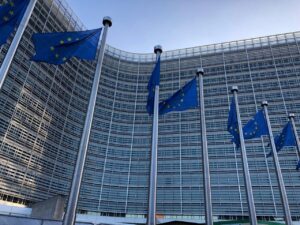The Rzeczpospolita daily reported that former German chancellor received his third position in Russia. After being on the board of Nord Stream and its twin Nord Stream 2 he received the proposal to join the Board of Directors at Russia’s TNK-BP. How come Germans have such a good opinion in Russia’s energy sector? This cannot be explained without mentioning the secret service, writes Wojciech Jakóbik, editor-in-chief at BiznesAlert.pl.
Russians have been investing in their relations with Germany since as early as the 1970s, when the infamous deal „pipes for gas” was made and Willy Brandt and Leonid Brezhnev agreed to tighten their political ties through developing economic cooperation, especially when it comes to gas deliveries. I previously wrote that this context begs the questions on how this relationship has been affected by secret services.
In 1970 the Federal Republic of Germany and the Soviet Union signed a long term contract for 1 bcm of gas deliveries annually as of 1973 and 3 bcm as of 1978. In return West Germany was supposed to offer credit for the purchase of 1.2 tons of pipes by the Soviets to build gas pipelines. Marcin Sienkiewicz, PhD, president of the Lower Silesian Institute for Energy Studies, wrote more about this in his article entitled „German-Russian gas cooperation”. The author reminds about Guenther Guillaume who was Brandt’s secretary and an officer of East German intelligence services. When his ties to the secret services were revealed, Willy Brandt’s government had to resign in 1974. However, the contract for gas supplies from Russia was not terminated.
Another chapter in the history of unclear relations between politicians and businessmen from Russia and Germany where secret services might have been involved is the engagement of Chancellor Gerhard Schroeder in promoting the Nord Stream pipeline. Today the pipe ensures constant supply of Russian gas directly to Germany at lower prices thanks to bypassing transit states with Ukraine on top of the list. This is a good deal for Germans while Russians use the opportunity to solidify their position on the Central and Eastern Europe market despite increasing competition. After Schroeder ended his political career he became head of Nord Stream’s shareholders’ committee. He also advocated for its successor -Nord Stream 2, for which he was heavily criticized in German media. It is very easy to find on the internet documents proving Schroeder’s involvement with the Stasi, the East German Ministry for State Security. Also Matthias Warnig, Vladimir Putin’s longtime friend who is Nord Stream’s managing director was involved with East German intelligence. He also received a position at Rosnieft and was a president at Rusal, an aluminum company. Currently, he meets with Putin 'at least once every three weeks’ according to the Guardian. Schroeder and Warnig visit Putin on his birthdays. During the Russian aggression on Ukraine they appeared at a party in Petersburg on 28 April 2014. Why not in Moscow? Perhaps because Gazprom’s headquarters is located in the city established by Peter the Great.
Another German politician who may join the peloton of proponents of cooperation with Russia may be Sigmar Gabriel, the current Vice-Chancellor, whose political popularity is waning both in the country and his party SPD, which Schroeder also came from. He got involved in the promotion of the Nord Stream 2 project and even promised the Kremlin he would not allow the European Commission „to meddle in it.” In a piece for BiznesAlert.pl I wrote that this might be one of the reasons why the EC was indecisive about the project. Currently the Commission is waging an internal dispute on the issue. There is no official information on Gabriel’s involvement with intelligence services when Germany was split in half. It is also worth reminding he defended Joachim Gauck’s candidacy for Germany’s presidential office at a time when the more radical left Die Linke criticized it. He said that the party’s position stemmed from their „concealed sympathy” to East Germany and dissatisfaction with Gauck’s efforts to reveal Stasi documents on secret collaborators. However, Gabriel’s defense of Nord Stream 2 begs the question whether after his political career is over, he will be able to count on a job in Russia, just like Schroeder.
Various press publications as well as books speculate about Angela Merkel’s ties to the secret service. The Polish media are especially interested in the subject. A book by Ralf Georg Reuth and Gunther Lachmann titled „The First Life of Angela M.,” is an interesting voice in the debate. The authors suggest that Merkel was fascinated with communism and her career was facilitated by Stasi agents engaged in the democratic revolution in Germany. However, there is no direct evidence that the Iron Chancellor had any ties to the intelligence. Still, this issue feeds the discussion on Merkel’s inaction regarding Nord Stream 2. She avoids talking about it and when she is forced to present her position she argues the issue is just about business and politicians should not engage in it. Is this just about defending her Grand Christian democratic coalition with the socialists, where Sigmar Gabriel has been playing a
Just by the very nature of the subject, it is difficult to uncover the truth about any politician’s relations with secret services. The subject requires tremendous research and should be left to professionals. However, it is worth noticing that the dispute about Nord Stream 2 apart from its political and business context may have a more personal character. It cannot be ruled out that the engagement in defending the project by some of its advocates is caused by their links with Russia, forged during the Cold War in the hopes of a peaceful retirement paid for in Rubles. This is why we cannot pretend that the controversial Nord Stream 2 project is just another attractive business plan. This is a crowning of a long-lasting policy of political rapprochement through economic symbiosis pursued by Germany and Russia, supported at every stage by people accused of links to the secret services of the Warsaw Pact.








